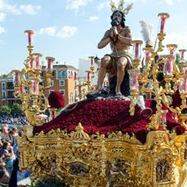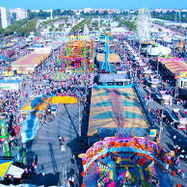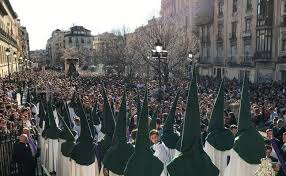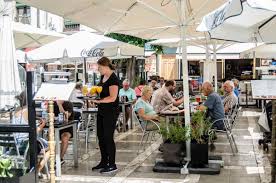TRADITIONS IN SPAIN
by Klemen Kusterle and Ainara's feedback
Holy Week in Seville
Holy Week in Seville is one of the two biggest festivals. It is celebrated in spring in a week leadin up to Easter and is a celebration that locals spend all year preparing for. It is being said it dates back to 12th centur , but it is confirmed that it exists atleast since 16th century.
From Palm Sunday to Easter Sunday, processions take over the streets of Spain. The enormous statues called "pasos", originally had an educational function and put an image to the passages of The Bible. There are up to three of these large statues in each procession. The people who walk the processions with the float are performing an act of penance, repenting their sins.
Seville Fair
In Spanish called "Feria de abril de Sevilla" is a fair that begins two weeks after Easter and it dates back to 1847 when it was originally organized as a livestock fair. It runs six days and for the duration of the fair, the fairgrounds and a vast area on the far bank of the Guadalquivir River are totally covered in rows of casetas. From around nine at night until six or seven the following morning, at first in the streets and later only within each caseta, there are crowds partying and dancing Sevillanas.
Since 1973, the Feria de Abril takes place at the real de la feria, an area of 24 blocks (450,000 m2) which is located between Los Remedios and Tablada. In 2012 there were 1048 casetas. Next to the Real is the Calle del Infierno (Hell Road), an amusement park which offers many recreational activities; a circus is usually set furthest from the Real on the back of the Parque de los Príncipes. Construction of the portada (the main gate) starts months in advance, and it takes several weeks to clear the place after the end of the Fair.


Nice job Klemen! I want to show you some other traditions
These are important festivals in Seville and, as we know, there are more in all regions of Spain. Focusing in Andalucía, some are hold in every city and others only in a city, for example, Los Patios of Córdoba (1), which is Intangible Culture of UNESCO. Holy Week (2) is celebrated in all cities. Everyday there are different processions according to the city.
Another tradition is the carnival (3) that is a celebration that takes place immediately before the Christian Lent and has a variable date (between February and March depending on the year). It traditionally begins on a Thursday and ends on the following Tuesday. The carnival combines elements such as costumes, groups that sing couplets, parades and street parties. The most famous Carnival is in Cádiz.
Another typical tradition in Granada is on the 3rd of May. This is the Day of Crosses (4). They are spread over the squares of the city and people eat typical food (5) and dance sevillanas (6).
1.  2.
2.
3.  4.
4. 
5. 6.
6. 
I think the most important tradition in Andalucia is eating out and meeting family and friends. When we celebrate something it is always with an important meal. We enjoy having tapas in a bar or a terrace.


On 24th June, the longest night in the year, we celebrate San Juan. We go to the beach and light fires and spend the whole night there. We burn things representing the past, as all your notebooks of the course (1). Going to the beach in summer is our favourite tradition we call it "summering" (2)
1. 2.
2. 
One funny Christmas tradition is to eat 12 grapes on New Year's Eve when the clock strikes the chimes.


By Ainara Guadix